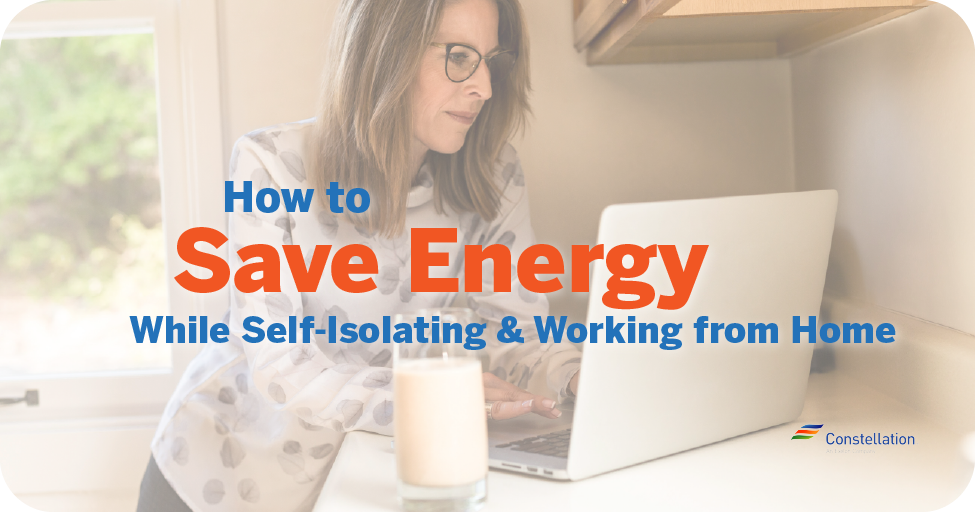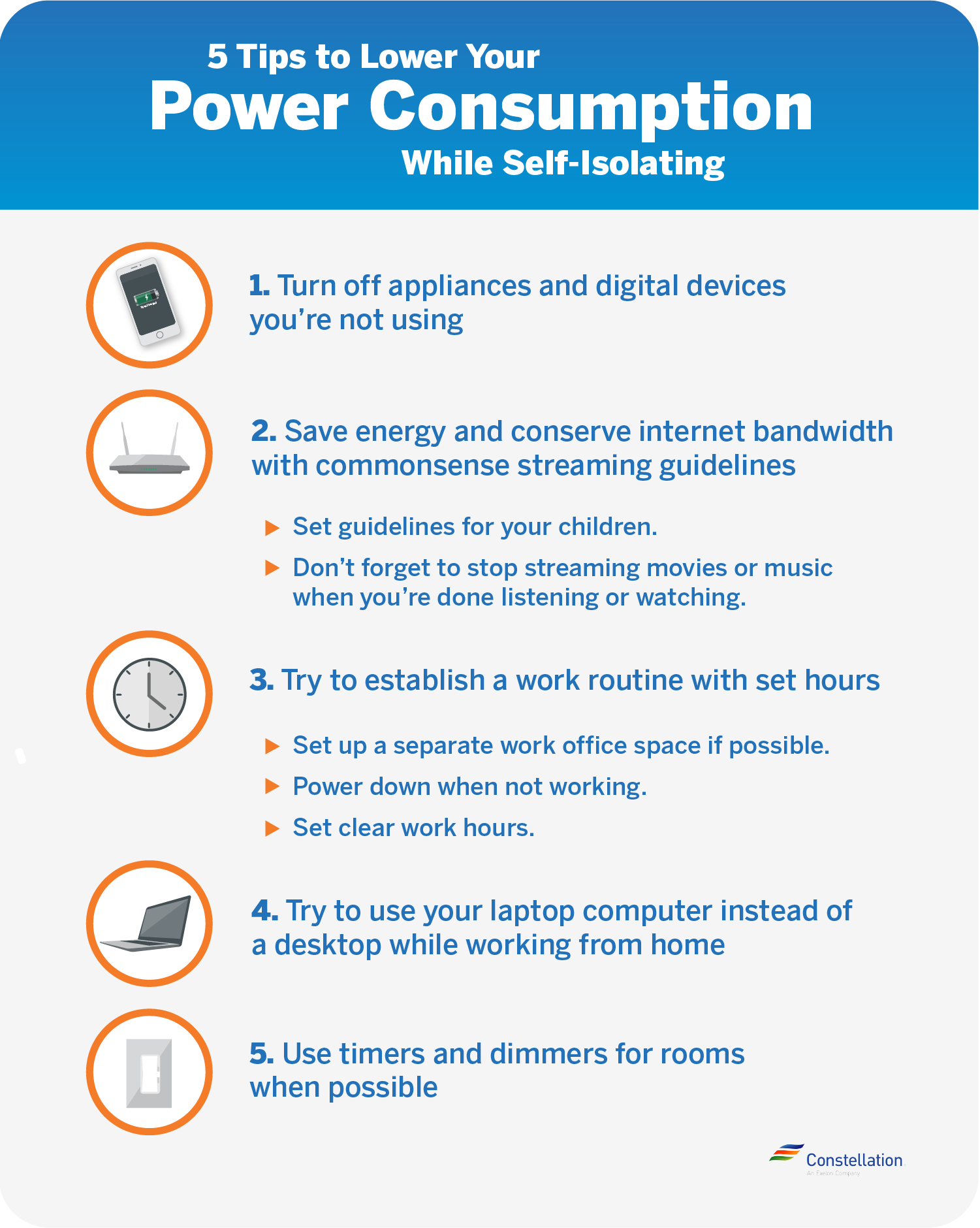
- Category:
Disaster Preparedness -
Last updated:
February 22, 2022
How to Save Energy While You’re Self-Isolating & Working from Home
If you’re looking for ways to keep expenses manageable in this economy, it can be helpful to examine the energy impacts of self-isolating and working from home. The guidelines recommended by government agencies to prevent the spread of the new coronavirus affect energy consumption. After all, entire families are home all day now.
Here, we’ll cover some of the choices and behavior that might be driving up energy use and suggest ways you can save energy during the COVID-19 outbreak.
How is the coronavirus outbreak changing home energy usage?
With millions of Americans staying home 24/7, overall demand for electric power has slumped. Power usage by consumers, however, is soaring. Energy costs have shifted from offices and schools to homes. Cloudflare, a company in the internet infrastructure sector, reports seeing dramatic increases in internet traffic globally, an indicator of the increased energy costs you may see working from home.
The hidden electricity costs of staying home during the coronavirus outbreak
In normal times, most homes are quiet during the day, when everyone is at work or at school. That’s different now. Life has changed in many ways because of the new coronavirus, and energy consumption has followed suit:
- Your social life has moved online as well. Social distancing doesn’t mean the end of your social life. Many people are socializing through online meetings, and not just for work. Virtual cocktail parties and groups watching movies together are becoming popular.
- Working remotely means you’re covering your own work-associated electricity costs. At your office, your company pays to power office machines and keep the lights on. You’re paying the energy costs of working from home, covering the electric bill for everything from your computer to extra lights to printers.
- The whole family is at home, including the kids. Working from home, attending school online and streaming entertainment all increase demand for power. You may be running your heater or air conditioner all day. You may also keep the lights on round-the-clock and could be using the hot-water heater, oven and washing machine more.
- Your children are playing and studying online. It isn’t just online learning that ups energy consumption. Many kids are entertaining themselves by streaming video, connecting to friends through social media or playing games.
5 tips to lower your power consumption while self-isolating
The impact of the coronavirus on energy consumption can be mitigated, but it isn’t possible to totally eliminate the energy costs of working from home, self-isolating and social distancing. It is possible, however, to save electricity while working from home.
Here are tips for home energy savings that can reduce electricity consumption during the COVID-19 outbreak.

1. Turn off appliances and digital devices you’re not using
Turning off lights, appliances and digital devices when you leave home is a habit for many. Saving electricity during the COVID-19 outbreak means continuing that habit even when at home.
Consider turning things off when you step away, even if you’re not stepping out. Turn off lights when you leave a room. Put electronics in sleep mode when taking a break. Plug in multiple devices into a power strip, which can make it easy to turn off a half-dozen potential power drains with one switch when breaking for lunch or ending the workday.
This is also a good time to consider smart home energy saving strategies.
2. Save energy and conserve internet bandwidth with commonsense streaming guidelines
Extra streaming at home can not only consume noticeably more energy but also put a strain on bandwidth. It can be awkward for parents when they’re having trouble reporting remotely to work because the kids are bingeing on movies. Establishing a few reasonable ground rules can help:
- Set guidelines for children. Screen limits are a good policy even during normal times, but now even more so that so many Americans have been asked to stay at home. Work with your kids to determine what they’re doing online and set up a reasonable viewing schedule. And remind them that there are many alternative ways to entertain themselves, get the wiggles out and have fun.
- Don’t forget to stop streaming movies or music when you’re done listening or watching. It’s easy to get distracted and leave a device on and streaming while not really paying attention. But streaming shows as background noise is a costly habit. You can save electricity during this outbreak by turning devices off when not listening or watching.
- Change viewing specifications. You can lower the power demand of screens when you turn down screen brightness, lower the volume and stream at lower resolution.
- Stream on lower-powered devices. Consider watching on a battery-powered tablet instead of your big-screen television. You’ll use exponentially less energy.
3. Try to establish a work routine with set hours
With boundaries between work and home all but gone and your daily structure removed, you may find you’re wrestling with productivity, distractions and work-life balance. Some may struggle with too much quiet and alone time, while others may have a hard time focusing with children and relatives distracting in the background. In either case, adding structure can help manage your routine and reduce electricity consumption while you’re self-isolating, because you won’t be running work devices all day long.
Consider the following working-from-home strategies:
- Set up a separate work office space if possible. Carve out a part of your home as “the office.” If you’re lucky, you might have an unused room. Otherwise, pick a quiet corner where you can focus — but is also a place you can leave at the end of the workday.
- Power down when not working. Whether you’re breaking for coffee, taking lunch or wrapping up at the end of the workday, power down your office machines. Put your laptop in sleep mode for short breaks and shut down for extended time away from work.
- Set clear work hours. You’ll be more efficient when you set up a schedule for work. With set work hours, you’ll be less distracted by that pile of laundry, and your children will know not to interrupt you when you’re “at work.”
- Be specific with your routine. Formalizing a schedule will help you stay focused and productive as well as fight procrastination and prevent things from slipping through the cracks. With specific goals and a plan of action, you’ll stay motivated and make progress. And that efficiency will limit your time on power-hungry devices.
4. Try to use your laptop computer instead of a desktop while working from home
Your laptop uses considerably less energy than your desktop with a big monitor. The average desktop consumes 194 kilowatt-hours of electricity per year, while a laptop uses 75 kilowatt-hours.
Additionally, pay attention to the power management settings on your laptop. Select the settings that minimize power use. Your screen might be a little dimmer, but you’ll be able to reduce more electricity while you’re self-isolating, and the energy savings can add up.
5. Use timers and dimmers for rooms when possible
Automate savings by plugging your lights, office equipment and other electrical devices into timers and dimmers. Scheduling times when things power up and down takes worrying about energy off your to-do list. In most locations, hardware stores that sell timers and dimmers are still open, or you could order them online. Purchasing these simple devices can save your household now and also in the long run. Be sure to purchase energy-efficient products with the best ENERGY STAR® ratings.
Stay calm and stream on
It’s completely understandable to feel overwhelmed during a pandemic. Aside from avoiding infection by the new coronavirus, Americans have the added stress of an economic downturn that’s throwing millions out of work. But that’s why keeping expenses manageable is so important. Saving electricity while working from home and self-isolating is very much in your control.




